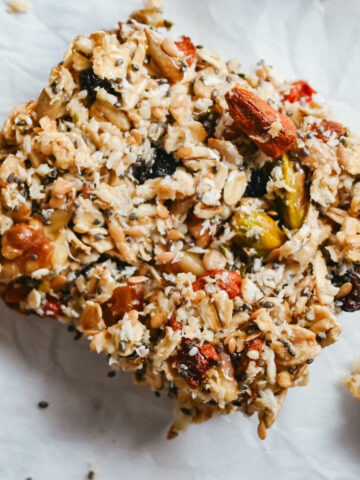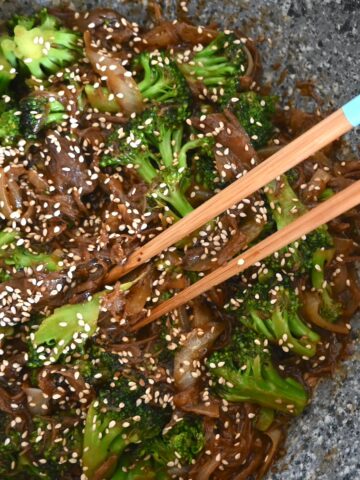Years ago, I did a few Whole30 program months to reset my body and figure out what food causes inflammation. Though I don't believe Whole30 can be a lifelong commitment, and it's not meant to be lifelong, hence the number 30, it is helpful to many people. Was it easy? No, but it was worth it and helped me better understand what foods work well with my body and which do not. Since I am a huge ketchup fan, I knew making a Whole30 compliant ketchup was important. This means no added sugar, high fructose corn syrup, no refined sugar of any kind, and no sugar substitutes. This homemade ketchup recipe is naturally sweetened with organic dates, making this Whole30 diet friendly and a great food freedom, paleo, and everyday ketchup.

Now let's talk about the whole food simple ingredients for this Whole30 ketchup recipe:
Organic Tomato Paste: Tomato paste is the base for most ketchup brands; nothing is different in this recipe. It is made by cooking down fresh tomatoes for hours, straining them, and cooking the puree longer. This helps concentrate the flavors and remove moisture. Cans of organic tomato paste are a pantry staple in our home, as in my Mom's and Grandmother's home. Please note: tomato puree will need to be cooked down prior to using as a substitute for tomato paste, so just grab some paste.
Organic Date Paste or Pitted Organic Dates: Date paste or pitted dates are a common sugar substitute in whole food recipes. Dates add the perfect hint of sweetness to balance acidic foods like a tomato. I am a huge fan of dates and use them often in various dishes. The difference between date paste and whole pitted dates is water, which is why either will work in this recipe.
Coconut Aminos: Made from fermented sap from a coconut palm tree and salt, it is a common substitute for soy sauce or tamari. It adds umami and salt flavors. Though it is widespread in Whole30 and paleo recipes, it is also the perfect substitute for soy sauce to lower the sodium levels in your dishes.
Organic Apple Cider Vinegar: Made like wine, Apple Cider Vinegar is created by fermenting apple juice. Then the ACV is ran through a second fermentation process to turn the alcohol into acetic acid. There are many health benefits to using ACV, but it is also mild vinegar that works well in various recipes that call for vinegar. There are two types of ACV, filtered and unfiltered. As far as cooking, they are interchangeable, but there are more health benefits to using unfiltered.
Mustard Powder: As you may have assumed, Mustard Powder is finely ground mustard seeds. If you do not have mustard powder, substitute it with Dijon mustard.
Organic Garlic Powder or Granules: dried and ground or finely ground garlic cloves makes garlic granules and powders. I prefer using garlic granules over powders, but the only difference is the size of the granule. One teaspoon of garlic granules or powders is comparable to two fresh garlic cloves.
Organic Onion Powder: made in a similar process as garlic powder and granules, Onion Powder is a great substitute when you need onion flavor in a dish but don't have any fresh onions on hand. One teaspoon of onion powder equals about ⅓ of a small onion.
Sea Salt: it would be great if sea salt had a list of health benefits compared to regular table salt, but it comes down to taste. I find that sea salt tastes better overall. My favorites are Jacobsen Salt Co., Redmond Real Salt, and Celtic Gray Sea Salt.
Optional: Organic Jalapeño Powder: this will add a little kick to your ketchup, so if you like spicy ketchup, this is an additional ingredient you will love. Made from dried jalapeños, this ingredient may be hard to find, so feel free to substitute it with cayenne or red chili flake.
While doing a Whole30 protocol, one of my favorite meals was a protein with Japanese sweet potato fries dipped into my homemade whole food ketchup. This would be good for any type of french fries or a perfect condiment for hot dogs, hamburgers, or chicken strips. It also serves as an ideal base for bbq sauce.
Though Heinz ketchup in a glass bottle will forever be nostalgic, as I near my mid-forties, it just has lost its luster, and a homemade version of your ketchup with just a touch of sweetness and a ton of flavor will forever be my favorite whole food friendly ketchup. You'll never want store-bought ketchup again unless you are my teenage son, who will still request regular ketchup, but it's all about personal tastes, and I hope you agree that this tastes ohhhhh sooooo good! Here's the best part, if you love it, consider canning small jars for the family.
Jump to:
Ingredients
- Tomato paste
- Medjool dates or 4 tablespoons date paste
- Apple cider vinegar
- Coconut aminos
- Garlic powder
- Mustard powder
- Onion powder
- Sea salt
- Filtered water
See recipe card for quantities.
Instructions
- In a saucepan, combine all ingredients except water. Bring to a simmer and cook for 10 minutes.
- Let the mixture cool slightly (5-10 minutes).
- Transfer the ingredients to a high-speed blender and blend on medium-high for 3 minutes until smooth and creamy.
- Enjoy your delicious homemade ketchup!
Substitutions
Feel free to adjust the ingredients to suit your preferences and dietary needs. Here are some substitution suggestions:
- Tomato paste: Substitute with organic tomato concentrate or tomato puree, but be aware it requires simmering to concentrate the flavor and remove excess moisture.
- Dates: Use prune puree or raisins for a different sweetness profile. You can also substitute 3 tablespoons of maple syrup or honey for the dates.
- Experiment with curry, smoked paprika, chipotle powder, or cayenne pepper for a personalized touch.
- Roast the tomato paste and dates for 10 mins in a 425 degree oven before blending for an intense tomato flavor.
- Apple cider vinegar: Substitute with white vinegar or lemon juice, but be mindful of the altered flavor.
- Coconut aminos: Use soy sauce or tamari, but expect a slight change in taste and sodium content.
- Garlic powder: Substitute with 2 fresh garlic cloves for a more intense flavor.
- Mustard powder: Dijon mustard can be used as a substitute, but the taste will be slightly different.
- Filtered water: to increase sweetness substitute pineapple juice concentrate
Variations
- Experiment with curry, smoked paprika, chipotle powder, or cayenne pepper for a personalized touch.
- Roast the tomato paste and dates for 10 mins in a 425 degree oven before blending for an intense tomato flavor.
Equipment
- Saucepan
- High-speed blender
Storage
Store your homemade ketchup in the refrigerator for up to two weeks.
Top tip
For a thicker ketchup consistency, simmer for a few additional minutes before blending.
FAQ
Yes, you can freeze the ketchup in airtight containers for up to 3 months. Thaw overnight in the refrigerator before using.section for your primary keyword, and answer them here
Enjoy it with fries, burgers, hot dogs, chicken wings, or as a dipping sauce for vegetables. It also makes a great base for homemade BBQ sauce.
This recipe is not spicy, but you can adjust the heat level by adding jalapeño powder, sriracha, cayenne pepper, or red chili flakes

Naturally Sweetened Homemade Ketchup - Easy Blender Recipe
Equipment
- 1 sauce pot
- 1 Blender
Ingredients
- 6 ounces tomato paste
- 10 pitted Medjool dates or 4 tablespoons date paste
- ⅓ cup apple cider vinegar
- 1 tablespoon coconut aminos
- ½ teaspoon garlic powder
- ¼ teaspoon mustard powder
- ¼ teaspoon onion powder
- ¼ teaspoon sea salt
- ⅔ cup filtered water
Instructions
- Place all ingredients in a saucepan and bring to a simmer. Simmer for 10 minutes. Let ketchup cool for 5 to 10 minutes
- Place ketchup ingredients into a high speed blender. Blend on medium high speed for 3 minutes. Let cool before using.
Related
Looking for other recipes like this? Try these:
Food safety
Preparation:
- Wash hands thoroughly with soap and warm water before and after handling ingredients and equipment.
- Sanitize all utensils and containers that will come into contact with the ketchup, using a hot soapy solution or a food-grade sanitizer.
- Thoroughly rinse and dry all fresh ingredients, especially tomatoes and dates.
Cooking:
- Bring the ketchup mixture to a simmer and cook for at least 10 minutes to ensure proper pasteurization. This helps eliminate harmful bacteria and extends the shelf life of the ketchup.
- Use a food thermometer to check the internal temperature of the ketchup. It should reach 160°F (71°C) to ensure safe consumption.
Storage:
- Cool the ketchup completely before storing it in the refrigerator.
- Store the ketchup in an airtight container to prevent contamination and preserve freshness.
- Label the container with the date of preparation and discard any leftover ketchup after two weeks.
- Do not reuse the container for other foods without thoroughly washing and sanitizing it first.
Additional Tips:
- Avoid adding raw ingredients like fresh garlic or onions to the finished ketchup, as they can contribute to spoilage.
- If you notice any signs of spoilage, such as mold, discoloration, or off odor, discard the ketchup immediately.
- Always follow safe food handling practices to prevent foodborne illness.









Leave a Reply